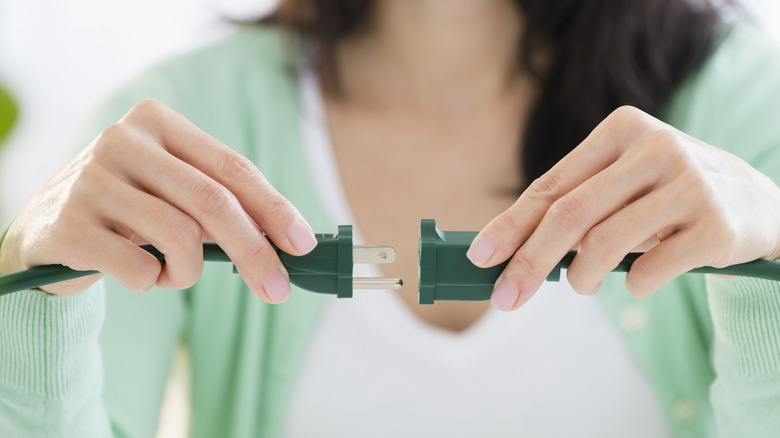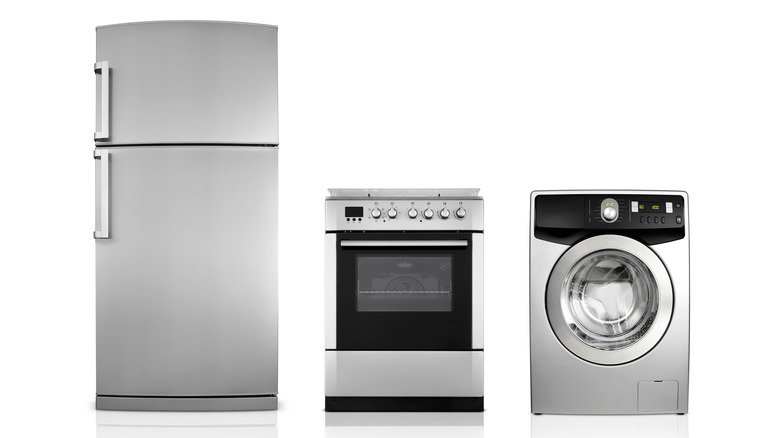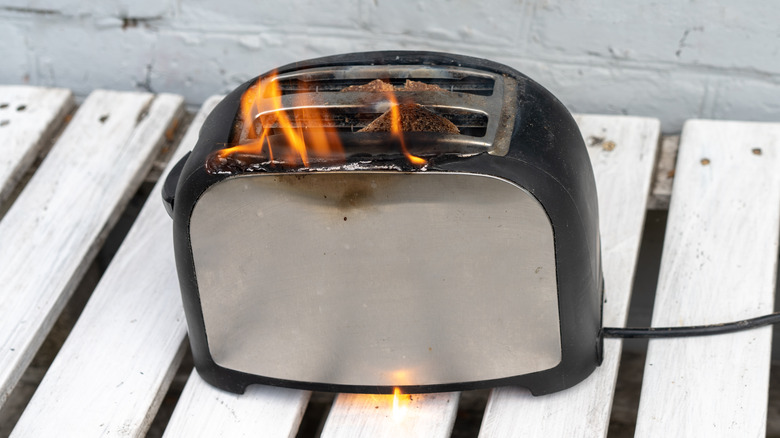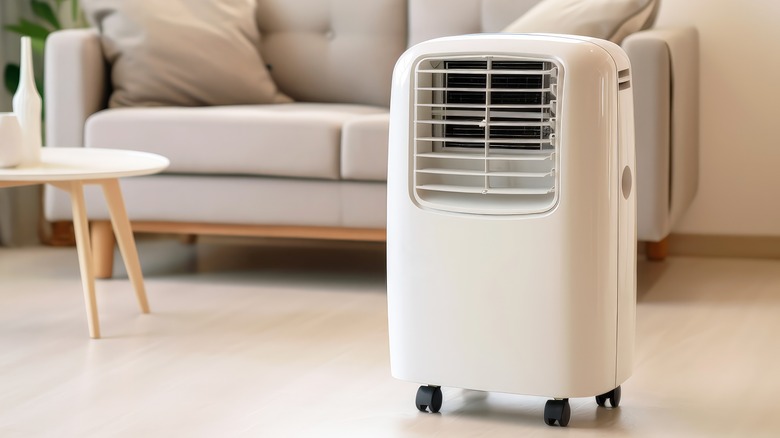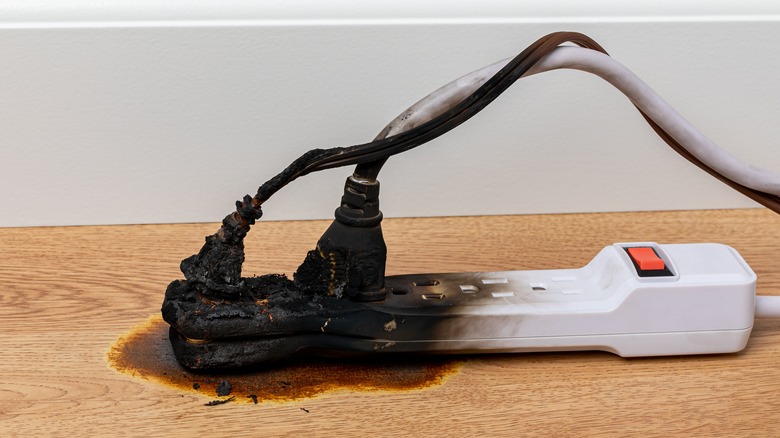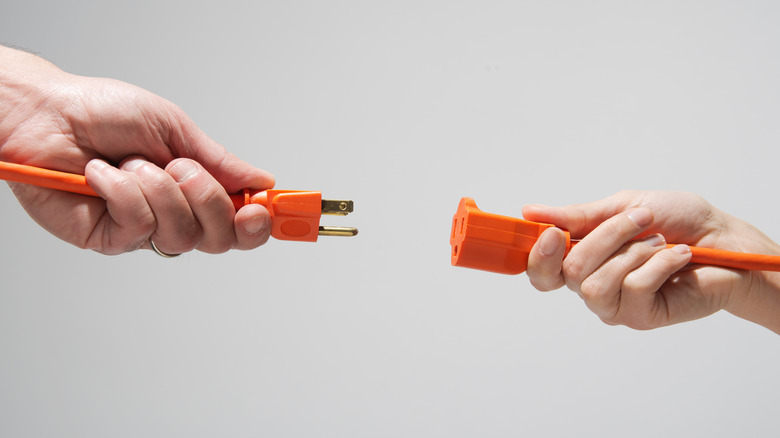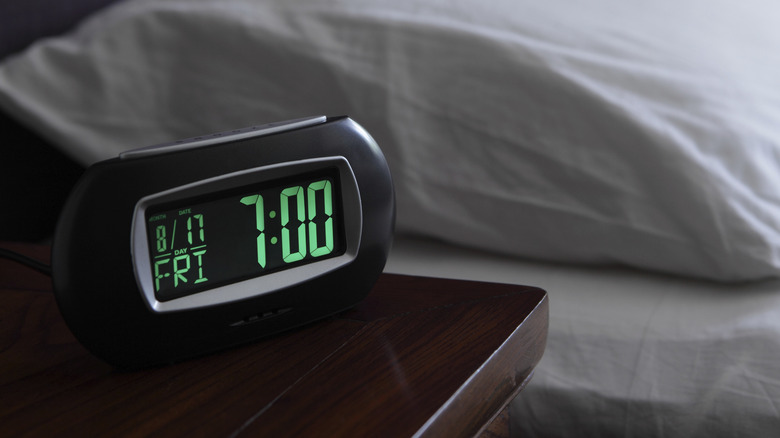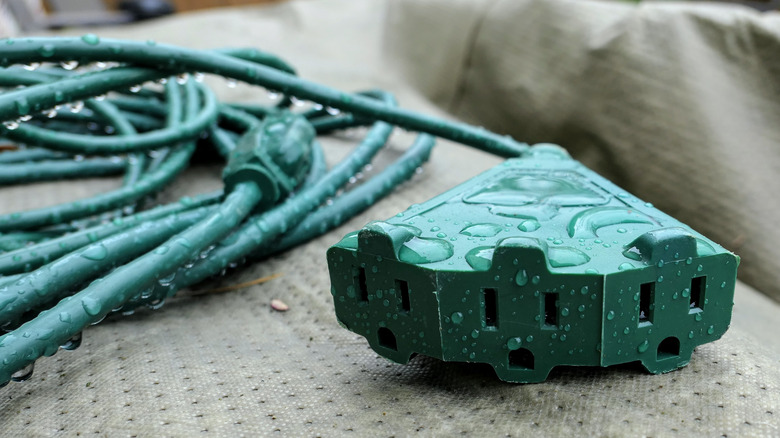7 Devices You Should Never Plug Into An Extension Cord
We may receive a commission on purchases made from links.
Extension cords have a plethora of uses — as long as those uses revolve around increasing the length of an electronic device's power cord. However, there's a fair bit of nuance when it comes to selecting and using extension cords, as well. You want to make sure you pick the right ones, and not just because of cost or convenience.
Decisions shouldn't be limited to picking between a regular cord or a wall-mounted version that'll keep them off the floor, either. You never want to use a cord meant for indoor use outside. Different cords have different power capacities, and they're not meant to be used in a permanent (or even semi-permanent) setup. Think of it like the idea that it's better to unplug your devices when they aren't in use, except instead of saving a little on the monthly electric bill, you avoid an increased fire risk.
On top of all that, though, you also have to pay close attention to what you're plugging an extension cord into in the first place. While they can be great for electric tools, yard work, or camping if you use an RV, there are some things you absolutely should not connect them to.
Major appliances
Amperage and wattage matter — a lot. Your average extension cord simply isn't built to handle the kind of electrical load put out by large appliances (think washing machines, clothes dryers, washers, that kind of thing).
Hooking a major appliance up to an extension cord, at best, risks damaging the appliance. That's only the best case, however. There's also a non-insignificant chance that the extension cord — which likely isn't rated to handle the amount of power the appliance uses — could overheat, and possibly cause a fire.
In particular, a lot of major appliances like refrigerators can use anywhere between 300 to 800 watts on average, while beefier models with more modern features like ice makers and such can require a dedicated circuit, meaning it needs its own outlet that's connected to its own breaker. RThe simplest way to think of it is that the larger the appliance the more you want to avoid plugging it into anything but a compatible wall outlet.
Small appliances
Really, you should try to avoid using extension cords on smaller appliances, too. For example, despite generally being quite small, toasters and toaster ovens use quite a bit of power — which could overload the cord and lead to, you guessed it, a fire.
Larger small appliances are no exception, of course. Microwaves are another no-no for extension cords because, like toasters, they tend to use more power than the average cord can handle.
Any small kitchen appliances should be kept away from extension cords, really. That includes mixers, blenders, air fryers, waffle makers, etc. If space or location makes plugging them in difficult, the best course of action is to temporarily unplug and move other small appliances that might be in the way so that you can plug them directly into the outlet and use them safely. It's bound to be inconvenient, but it's a small price to pay for not inadvertently causing an electrical fire.
Air conditioners or space heaters
Despite how tempting — almost necessary — it might feel to use an extension cord with an air conditioner or space heater, these are both things you absolutely should not do that with. The U.S. Consumer Product Safety Commission (CPSC) estimates that portable heaters alone caused an average of 1,700 house fires every year between 2017 and 2019. They can (and sometimes do) cause bedding, drapes, and other common — but flammable — household items to catch fire, and that's ignoring the very real possibility of overloading an extension cord.
Air conditioners aren't quite as high a risk since they don't exist to make the air hot, but it's just as inadvisable to plug one into an extension cord due to a similar risk of overload. That said, there are extension cords made specifically for appliances like air conditioners, which you can find a wide selection of on Amazon and at specialty hardware retailers like Home Depot.
If you pay extremely close attention to the cord's AWG (American Wire Gauge) rating, compare that to the AC's power requirements, and use the shortest applicable cord that will still work (because the longer a cord gets, the less effective it becomes), using a designated appliance extension cord should be alright. Ensure the cord is made for this kind of use and can handle the necessary electrical load before attempting to hook anything up.
Surge protectors
There's a less than zero chance that you or someone you know has previously plugged a surge protector into an extension cord. Or plugged an extension cord into a surge protector. Heck, there's a chance of that being the case right now.
As with all of these other examples, this is a terribly bad idea, and for most of the same reasons. A hookup like this can decrease efficiency by reducing a current's voltage (because the longer the cord the larger the drop-off), but also runs the very real risk of an overload of either of both electrical conveyances and a subsequent fire.
The thing is, even if you get lucky and never encounter such dangerous issues (SlashGear absolutely does not recommend trying your luck, do not do this), there's one more thing to consider: An extension cord and power strip combo can also void the warranty on some electronic devices, leaving you no official manufacturer support if things break or otherwise start to act up. Additionally, some home insurance policies may not cover you in the event of a fire if said fire was caused by this particular form of daisy-chaining.
Other extension cords
Just like with surge protectors, chaining multiple extension cords together poses a very real risk. Also, just like surge protectors, said risk involves overloading one or multiple connected cords and possibly causing an electrical fire, in addition to many of the same less overtly dangerous drawbacks covered previously, like diminished effectiveness and voided warranties (or denied insurance coverage).
In the event that you need a longer extension cord, it's highly recommended that you simply use a longer cord. If you don't have one on hand, buy one or borrow one from a friend or neighbor (assuming they have what you need).
If you do borrow a cord — or pull one out of storage — make sure to check the full length of it before plugging it in. Any fraying or other signs of damage should be taken seriously, and the potentially (or visibly) damaged cord should not be used.
Anything that's always on
The point of your average extension cord is to act as a temporary power cord, well, extension. Emphasis on "temporary," because they're not really meant to carry a constant electrical load indefinitely.
Brief or even extended use while trimming hedges, blow drying hair, and so on is fine. A few hours of use aren't likely to cause any problems — provided the cord isn't damaged, anyway. But decorations left on all night? A refrigerator? A computer you never turn off? Not recommended.
Smaller items are no exception, either. It's fine if you need to use a hair dryer for a few minutes, trim some hedges, or whatever. However, even something as innocuous as a clock should be kept clear of an extension cord. If you absolutely need an extra foot or so in order to plug an alarm clock in, either find a different spot for it, rearrange the room, or use a surge protector instead.
Outdoor electrical devices during bad weather
Rain and snow in particular are something you need to keep an eye or ear out for if you use any extension cords outside. Electricity and water are never a good mix, and cords left plugged in when the weather gets rough are more likely to take in water — or have the outer casing damaged, which could then expose it to water. This could lead to whatever the cord is plugged into shorting out, someone touching the cord (even accidentally) receiving an electric shock, or a short that could cause a fire, of course.
Outdoor extension cords do exist and are specially designed to stand up to tougher conditions than those meant for indoor use. In fact, you should avoid using indoor extension cords outside altogether and stick with cords that are made for outdoor use. Even then, you still need to be careful.
Not all outdoor extension cords are waterproof, though, and even if they are waterproof, you should still make sure they aren't left sitting in snow or puddles of water.
